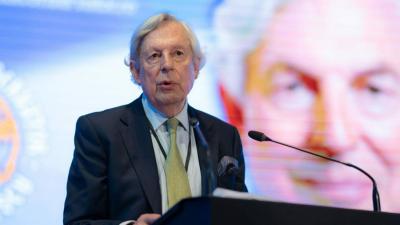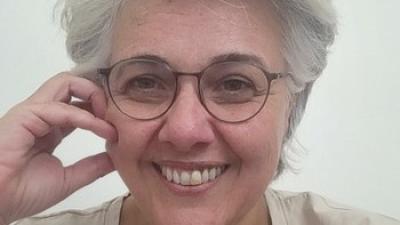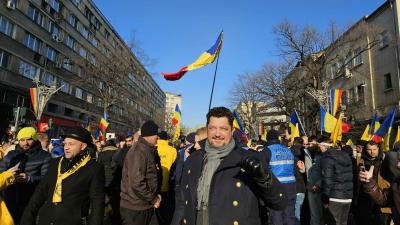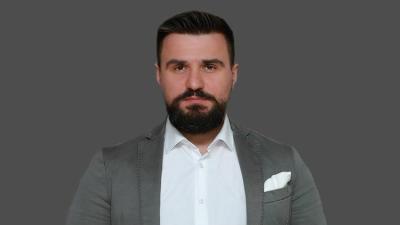“The West dropped its guard and was slow to recognise the emergence of a new, revanchist dictator in Russia”: An Interview with Geoffrey van Orden
Geoffrey Van Orden is a former British army brigadier-general who subsequently spent 20 years as a Member of the European Parliament. He was the last leader of the British Conservatives in the parliament, was instrumental in the creation of the European Conservatives & Reformists political group and was defence and foreign affairs spokesman. He is currently a Vice-President of New Direction – the Foundation for European Reform, and a Distinguished Fellow of the Washington-based Gold Institute for International Strategy.
Álvaro Peñas: The UK, unlike other countries, has been committed to the defence of Ukraine from the outset and has not wavered in its support. What are the reasons for the UK’s position?
Geoffrey Van Orden: The Ukraine is the outer bastion of the UK’s defences. Until the age of air power, the United Kingdom could rely on the Royal Navy to guarantee its security. Clearly, in the missile age, this is no longer the case. A consistent theme of British foreign policy was to prevent domination of the continent of Europe by a single, overwhelming power that might present a threat. This was achieved through a system of alliances in order to restore balance. After the defeat of France in 1815 and Germany in 1945, it was the Soviet Union and communism that presented the threat. This was deterred by the power and solidarity of NATO, the transatlantic alliance which united the democracies of Europe and North America. After the collapse of communism, the West dropped its guard in pursuit of a peace dividend but fortunately NATO remained intact and grew in numbers. It was slow to recognise the emergence of a new, revanchist dictator in Russia. The seizure of the Crimea in 2014 was a shock. Although the lessons of history are often ignored, we are very conscious of the failure of appeasement in the face of aggression. When Russia launched its full invasion of Ukraine in 2022 we were determined to give Ukraine every possible support, short of going to war, and show that aggression does not pay. We hoped that our leadership would encourage others. It is in the interest of the UK and the West that Ukraine should not be defeated.
How is it possible that there are so many European politicians who are incapable of understanding that a nation that invades a European country and threatens to use nuclear weapons against Europe is an enemy?
The West has grown soft. We have generations of people who have known nothing but peace and prosperity and wish to do nothing to upset this situation, imagining that the rest of the world has a similar view. At the same time, many heads have been filled with negative views about our democracies, our history, our traditions and institutions. Within many continental European countries there are still Marxist parties and politicians with innate sympathy for Moscow and its ambitions. Historically, the relationship between countries such as Germany, France and others with Russia has been ambivalent for strategic, political and economic reasons.
You say that our Achilles’ heel comes from the demoralisation of nations, a phenomenon encouraged by Russia and its allies and fuelled from within by the radical left. How can this demoralisation be confronted?
We need to be more robust and active in encouraging pride in our countries and combatting subversion. This must begin in our schools and universities. In addition, young people need to be better educated in dealing with social media and applying common sense – there is a good case for banning smartphones in schools. In many Western countries there is also a growing Muslim population which is vulnerable to radicalisation not least through extremist madrassahs and preachers. We should impose controls, following the lead of many Muslim countries. At the same time, we need to take the battle to the enemy and make greater effort to promote our values and ensure that people living under autocratic regimes hear the truth.
Due to woke politics, the RAF did not fill the quota of fighter pilots because of diversity and minority rules. This led to several resignations, but presents a serious danger to national security. Shouldn’t the armed forces be kept away from all these political fantasies?
Yes. While the armed forces recruit from society at large, they should not be a mere reflection of that society but promote their essential values of loyalty, duty, respect, selfless service, honour, integrity, and personal courage.
Where does the greatest challenge for the West lie, abroad or in domestic policies of open borders and green pacts?
The West faces multiple challenges, both internal and external. Mass uncontrolled immigration of people from entirely different cultures and habits is sheer madness. While the genuinely persecuted are rightly offered sanctuary, and small numbers of other people with particular skills or resources can be integrated into our societies, we are demonstrably incapable of properly integrating very large numbers of strangers. The effect is unwelcome changes to our own systems and loss of national cohesion at a time when this is more necessary than ever. The vulnerabilities and fractures in our society are exploited by external enemies. While we had imagined that conflict between European states was a thing of the past following the collapse of the Soviet Union, the invasion of Ukraine has provided a salutary shock. The West needs to rearm and demonstrate the solidarity and resilience of its alliances, particularly NATO. EU involvement, through its autonomous defence ambition, is a dangerous distraction from this.
In your speech in Bucharest, you spoke of the importance of strengthening NATO. Besides an increase in military spending, what more needs to be done to achieve a strong alliance?
NATO is both a military and political alliance. Every NATO ally needs to enhance the strength and capability of its armed forces and its political willingness to commit them. Greater attention also needs to be given to our ability to sustain our forces in combat. This means greatly improved defence industrial capacity, more attention to reserves of manpower, and greater effort to educate our people about the importance of our armed forces and why we need to devote more resources to them. Public opinion is both the strength and weakness of our democracies when under stress.
You played a very important role in the creation of ECR, how do you see your expectations, and do you think that ECR could, as has happened in Italy, bring the EPP back to the centre-right?
Yes, I was instrumental in the creation of the ECR Group and of its associated think-tank, New Direction. Our Prague Declaration, drawn up in 2009, provides the 10 basic principles on which the ECR was founded including the sovereign integrity of the nation state, the overriding value of the transatlantic security relationship in a revitalised NATO, and effectively controlled immigration. These principles have stood the test of time and the ECR is now well established as the reasonable, decent face of the centre-right. I believe the parties of the centre-right will increase their representation in the European Parliament at the elections in June and that this will enable the ECR to grow, hopefully to become the third largest group in the parliament once more. The EPP has a contrary view on the fundamental issues – in particular it sees itself as the engine of European integration, wishes to see the nation states diminished, and believes in an EU defence policy and EU strategic autonomy which would create tensions with the United States and distract from NATO. Its members are just beginning to see the perils of mass immigration and on that basis may well seek a closer relationship with the ECR on particular issues.
Would it then be possible to return to the founding principles of the EU? Can the Conservatives save the EU from itself?
The EU (1993) had various previous incarnations including as the ECSC (1951) and EEC (1957). There is therefore a ‘pick and mix’ of founding principles. Originally (ECSC) it sought to remove historic rivalries by creating an economic community among peoples long divided by bloody conflicts. It was the EEC Rome Treaty that expressed the determination to create ‘ever-closer union’ among the peoples of Europe, so the idea of European integration and the withering away of the nation state was there from the start. The EU concept was driven by a very small group of political intellectuals. This continues to this day. A common market of independent nation states was never quite what they had in mind. The fact is, most people across Europe just want an EU organisation that will help improve their economic prosperity – all the rest is superfluous. The EU has now created its own momentum and as long as the Germans are willing to continue paying, it will carry on.
This interview was originally published on: “The EPP is just beginning to see the perils of mass immigration”: An Interview with Geoffrey van Orden ━ The European Conservative
Read also
Interview with Yobana Carril
“I never thought that in Spain I would see that the same crime committed by two individuals would be punished differently depending on their sex”
Álvaro Peñas
Time for AUR?
According to the latest polls, the Alliance for the Union of Romanians (AUR), born in 2019, would be the first choice for the majority of Romanians in the next European elections, and could win up to 12 MEPs.
Álvaro Peñas
Oleksandr Shulga: “The West must understand that, unlike Putin, the Russians do have limits”
Our war is defensive and aims to drive out the invader and show the Russian regime and society that this war is pointless and will achieve nothing.
Álvaro Peñas
Carolina Barrero: “In Cuba there is no food or medicine, but the regime builds hotels rather than hospitals”
Interview with Carolina Barrero, activist for the defence of human rights in Cuba, self-exiled in Spain since February 2022.














Comments (0)